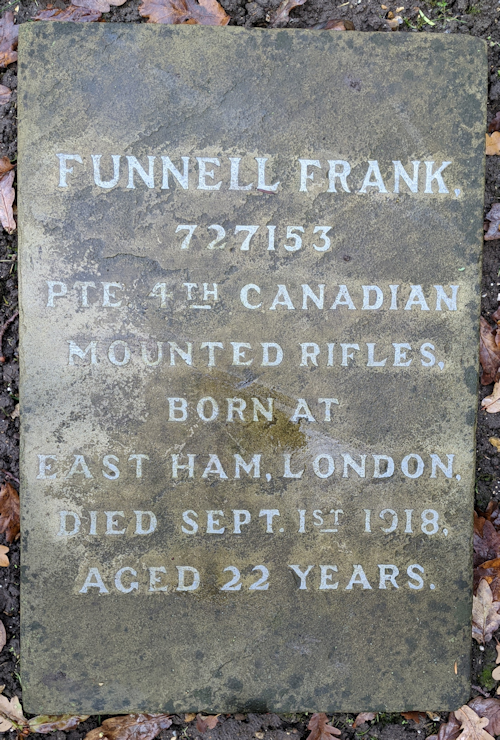
727153 Pte. Frank Funnell
Cliveden War Cemetery
Taplow
Buckinghamshire
England
Frank was born on 9th October 1897, in Pembury, Kent (as confirmed in the 1901 UK Census and on his Commonwealth War Graves Commission entry), though currently his headstone erroneously states East Ham, London.
The young Frank was sent to Canada on May 16th 1905, aged 8. Departing from Liverpool on the Lake Manitoba, for Quebec, he travelled with 149 other children under the Annie McPherson Home Children scheme. His mother's address, most oddly, was given as the actual McPherson Home in London, the seat of the child migration scheme, which had started in 1869.
Nothing is known of Frank's life for the next ten years, until he answered the call to arms and signed up in Listowel, Ontario, on December 3rd 1915. Assigned to the 110th (Perth) Battalion, he was a farmer by trade (more than likely an indication of what he had been doing as a "Home Child" in the meantime) and was single. After training through to late 1916, the 110th BN was sent to England, transitting on the SS Caronia from Halifax, Nova Scotia, which arrived in England on November 11th 1916.
Just 13 days later, on November 24th, Frank was admitted to Ravenscroft Military Hospital, Seaford, Sussex, with tonsillitis. He was discharged on December 1st. However, Frank was admitted again with influenza, this time, on December 20th, and after Christmas in hospital he was discharged on January 10th 1917. During this time, on January 1st 1917, Frank was transferred to the 8th Reserve Battalion.
After further training, with men constantly being sent to regiments as draft replacements, Frank was amongst 12 men transferred to the 4th CMR on June 16th, joining their new regiment in the field near Villers-au-Bois, NW of Arras, France. Frank served without incident until October 22nd, when he was handled by 22 Casualty Clearing Station, again with influenza. He was moved to No.4 General Hospital, Dannes, France (south of Boulogne, north of Etaples) on October 25th and on to No.6 Convalescent Depot, Etaples, on November 1st, before finally being transferred, on November 5th, to No. 14 Convalescent Depot, Trouville, from which he was discharged on December 9th.
Again, serving with the 4th CMR without noted incident on through 1918, the regiment had just moved 3 miles / 5km east of Arras, to Feuchy on August 24th 1918, when the left, "D", company was shelled with gas and shrapnel rounds, causing casualties to 5 officers and 116 men. Frank was wounded by a gas shell bursting very close to him, showering him in "yellow cross" mustard gas liquid, which inflicted second degree burns on his back, right thigh and leg, and first degree burns on his arms, left leg and neck.
Transferred to the administrative oversight of the 1st C.O.R.D. (Central Ontario Reinforcement Depot) on the 25th (when his wounding was first officially acknowledged) Frank was moved to England for treatment on August 29th. He was taken to 15 Canadian General Hospital (Duchess of Connaught Canadian Red Cross Hospital), which had been built in the grounds of Cliveden House, Taplow, in Buckinghamshire. Sadly, however, Frank passed away at 05:45 on the morning of September 1st 1918.
727153 Pte. Frank Funnell lies at rest in the War Memorial Garden, Cliveden War Cemetery, in the grounds of Cliveden House.
The biography is courtesy of researcher David Kavanagh and the headstone image is supplied by 4cmr.com
PLEASE NOTE: the War Memorial Garden is on the grounds of the National Trust's Cliveden House, and is not accessible to the general public without prior arrangement with the Estate Office at Cliveden House.